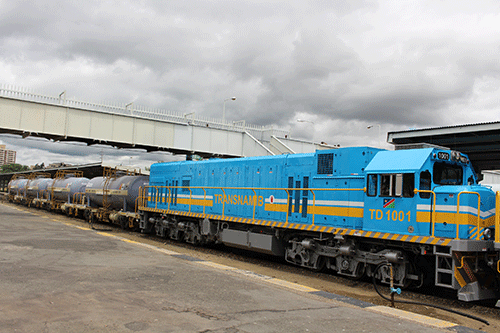After four years of running around to source funding, the national rail operator has finally secured a long-term loan of N$2.6 billion to implement its five-year business plan. This as TransNamib hits the track to profitability to plug its bleeding balance-sheet and stabilise its revenue.
Announcing the much-needed funding yesterday, TransNamib CEO Johny Smith recalled the managerial nightmare he had to endure during the last couple of years. This was because he was shown the door out of numerous meetings while trying to convince financiers that the dream to deliver on the business plan could be realised.
Eventually, the State-owned rail operator managed to secure a long-term loan, for which terms and conditions still need to be finalised, from the Development Bank of Southern Africa (DBSA), in partnership with the Development Bank of Namibia (DBN).
“In April 2020, when we lost 50% of our revenue, I went through times of sleepless nights. I am very glad and happy that it’s now time for us to work and take the organisation where it is supposed to be,” said a visibly relieved Smith at the announcement.
He explained that the loan will be used for the remanufacturing of rolling stock, acquisition of new rolling stock, modernisation of the TransNamib workshop and the upgrading of signalling equipment, including spares and associated equipment.
At yesterday’s announcement, transport minister John Mutorwa said at the launch of the company’s Strategic Business Plan in 2018, the organisation was in bad shape in terms of the quality of its leadership, governance and overall performance.
“The government is confident that the secured funding will provide major capacity for TransNamib in terms of its rolling stock. Government will continue to support the efforts of the company, and remains committed to the improvement of rail infrastructure,” he emphasised. Mutorwa added that the ultimate success of Namibia, and its ability to become a logistics hub for southern Africa and beyond heavily depends on it having an efficient railway system and rail infrastructure.
“By its design, rail is made to accommodate large volumes of bulk freight and containers. Thus, railway remains a critical economic enabler that will allow tangible benefits in terms of the bottomline for the end-consumers,” the minister noted. Mutorwa further allayed fears about TransNamib’s liquidation, stressing that the company’s importance to the nation would not allow that to happen.
At the same occasion, DBSA head of SADC coverage Davies Pwele said this funding stems from the 2019 Investment Summit held in Windhoek, where the DBN and the DBSA jointly pledged N$8 billion towards infrastructure development in Namibia. Amongst this was the pledge of about N$2.6 billion towards TransNamib.



